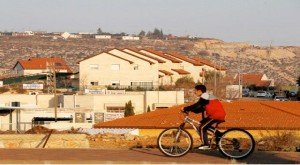
The practice of enforcement measures such as forced transfers, evictions, demolitions and confiscations of homes and humanitarian assets (including EU-funded) and the obstruction of delivery of humanitarian assistance are contrary to Israel’s obligations under international law,
JERUSALEM (Reuters) — The European Union has expressed frustration with Israel over its demolition of Palestinian homes in the occupied West Bank, with the EU ambassador taking the unusual step of reading out a joint statement denouncing the practice.
At a meeting last week with the Israeli foreign ministry’s newly appointed director-general, the ambassador delivered a stern diplomatic message, saying Israel was failing in its international legal obligations and needed to change policy.
The issue came to a head after Israel issued demolition orders last month against 42 homes in the Bedouin village of Khan al-Ahmar, east of Jerusalem, where EU member states Belgium and Italy have funded a school and helped build structures for the local population of around 150.
“The practice of enforcement measures such as forced transfers, evictions, demolitions and confiscations of homes and humanitarian assets (including EU-funded) and the obstruction of delivery of humanitarian assistance are contrary to Israel’s obligations under international law,” ambassador Lars Faaborg-Andersen said, with envoys from all EU member states present.
“We therefore call on Israel, as the occupying power, to meet its obligations vis-à-vis the Palestinian population…, completely stop these demolitions and confiscations and allow full access of humanitarian assistance.”
Faaborg-Andersen’s intervention was first reported by Israel’s Haaretz newspaper.
A spokesman for the Israeli foreign ministry declined to comment on the substance of the statement, known in diplomatic parlance as a demarche, but said it was delivered at a “get to know you” meeting with the ministry’s director-general.
The clampdown against Khan al-Ahmar, located in a sensitive area of the West Bank that Israel has earmarked for settlement expansion, is the latest in a series of demolitions that have been roundly condemned by the EU and the United Nations.
Israel says the demolitions are necessary because the building was carried out without a permit in an area of the West Bank, known as Area C, where Israel retains full control. Area C makes up 60 percent of the West Bank, which the Palestinians want for their own state together with Gaza and East Jerusalem.
The EU says Israel rarely issues permits in Area C and is concerned that by blocking Palestinian development there, and demolishing structures that are built, it is actively undermining the viability of any future Palestinian state.
Figures from the United Nations office for the coordination of humanitarian affairs show that Israel has sharply stepped up demolitions in Area C over the past year.
While between 450 and 560 Palestinian structures were demolished each year from 2012-2015, the number jumped to 876 in 2016, and in January this year alone there were 121 demolitions. More than 1,200 people were displaced last year.
To underscore concern about the threat to Khan al-Ahmar, delegations from EU embassies have been visiting the site regularly. Officials hope public diplomacy might help secure an Israeli Supreme Court injunction against the demolitions.
That worked with an earlier demolition order targeting the Palestinian village of Susiya, in the southern West Bank.
“We’re not giving up,” said one EU diplomat, while acknowledging that it was an uphill battle to stop the demolitions. “We have to be realistic.”

